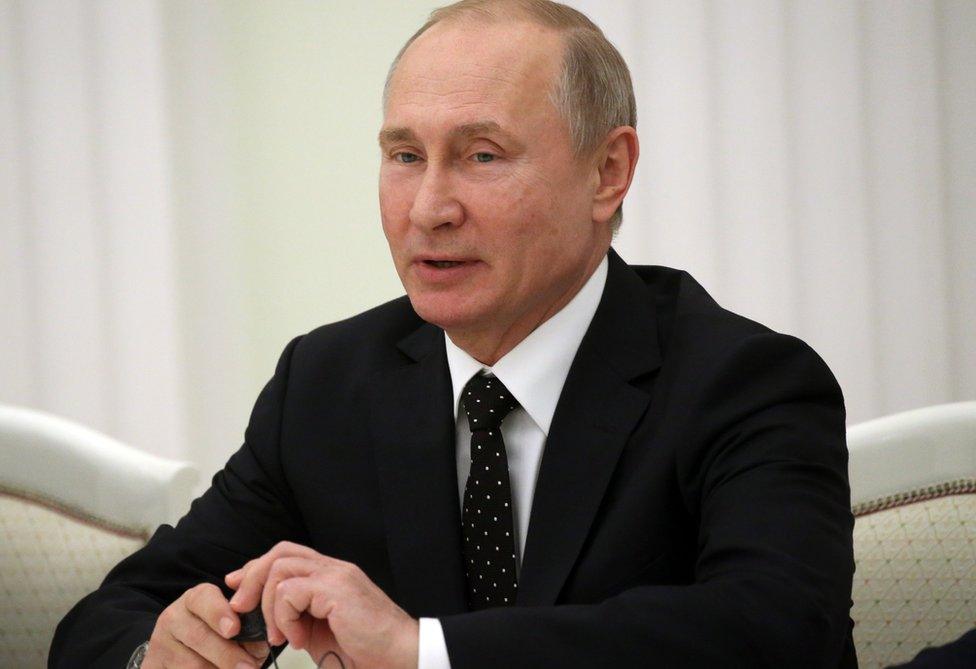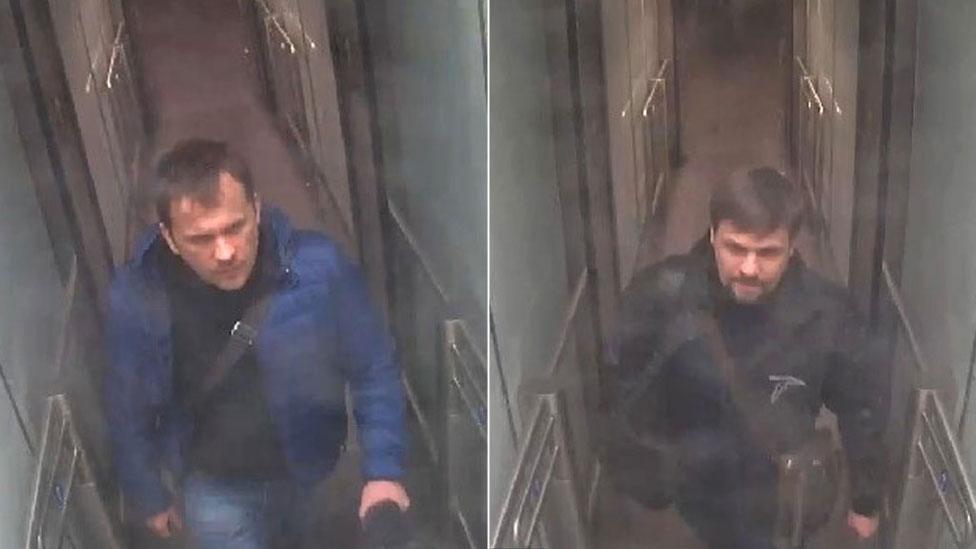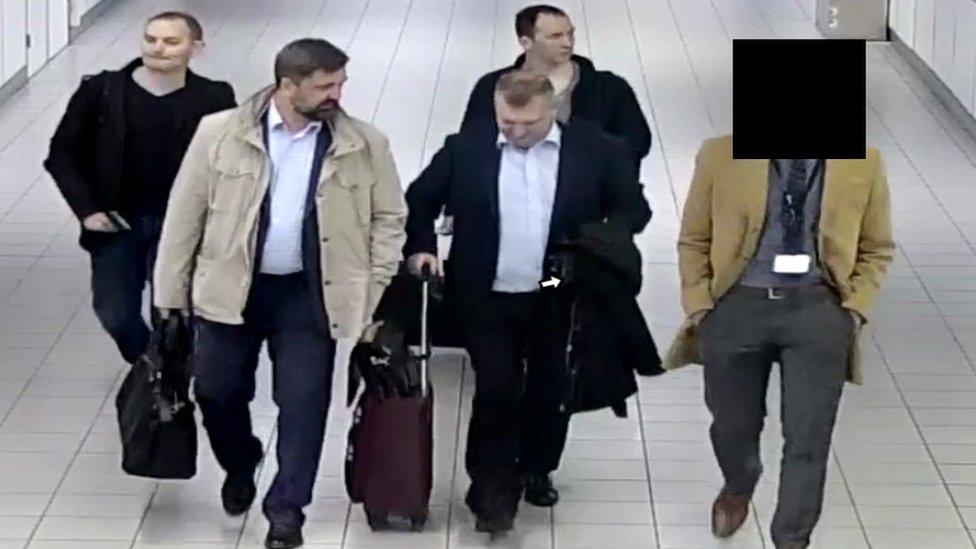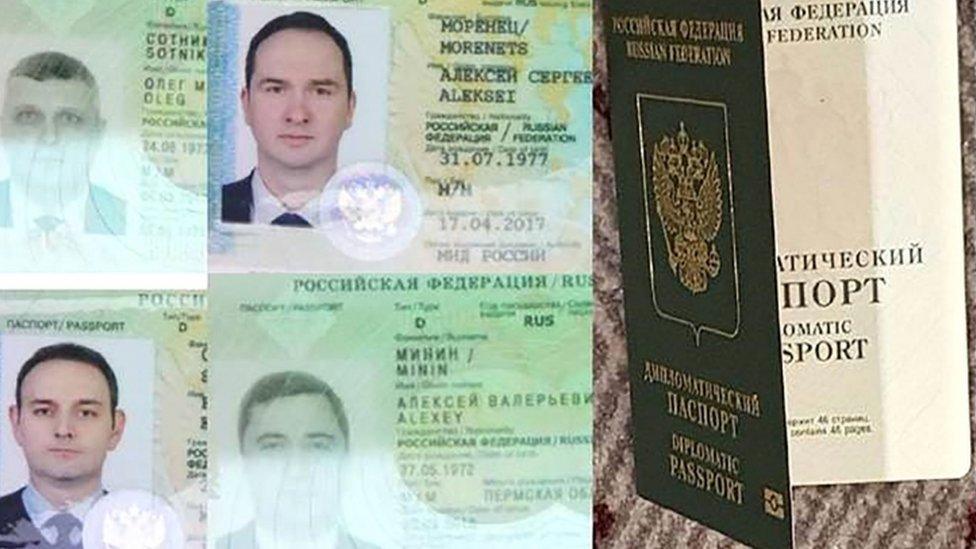Putin: Russia foiled work of almost 600 spies
- Published

President Putin said foreign intelligence agencies were trying to access Russian technology and data
President Vladimir Putin has accused foreign intelligence services of beefing up activities in Russia, announcing that hundreds of spies were stopped in 2018 alone.
Without going into details, he said "129 staff members and 465 agents of foreign special services were foiled".
Russian spies have themselves been accused of several plots, including the poisoning of ex-agent Sergei Skripal.
Dutch, Czech and Swedish intelligence all say they have foiled attacks.
Russia has also been accused by the West of trying to interfere in elections. Without naming Russia, the president of the European Council, Donald Tusk, warned on Tuesday that "anti-European forces" might try to target EU Parliament elections in May.
In his speech to officers of Russia's FSB security service, Mr Putin said their work had to be efficient, especially in protecting data on the development of weapons systems.
"We see foreign intelligence agencies trying to increase their activity towards Russia, seeking by all means to access political, economic, scientific and technological information," he said.

Putin delivers his annual scorecard
By Steve Rosenberg, BBC News Moscow
It's become something of a Russian tradition.
Each year, in late winter or early spring, Vladimir Putin visits Russia's federal security service, the FSB, for a board meeting.
And in a speech there, he announces how many foreign agents Russia managed to catch the previous year. It's Moscow's annual scorecard of spying.
Judging by the latest figures, espionage is on the up.
Four years ago, President Putin revealed that 52 staff members and 290 agents of foreign intelligence agencies had been uncovered in the previous 12 months. The Kremlin's latest catch is 129 and 465.
Still, keep in mind three points:
We have no way of verifying the figures
A Russia swamped with foreign spies neatly fits the Kremlin's current narrative that Russia is a besieged fortress threatened by the West. Plus, high numbers of uncovered agents makes the FSB look good - it suggests the spy catchers are doing their job.
Vladimir Putin may claim that "foreign intelligence agencies are trying to boost their activity in Russia" but don't forget: Russia spies on the West, too. And Western powers have accused Moscow of trying to extend Russia's own network of foreign agents.

After EU leaders agreed with the UK that Russia was highly likely to have been behind the Skripal attack in Salisbury last year, more than 25 countries expelled Russian diplomats.
The head of the British army, Gen Mark Carleton-Smith, said last year that Russia was seeking to "exploit vulnerability and weakness wherever they detect it"., external
Several intelligence agencies have acted against alleged Russian spy networks.

CCTV of two suspects in the Skripal attack whom the UK believes are from Russia's military intelligence service, the GRU
In December, the Czech Republic said it had broken up a group that used the Russian embassy as cover.
Dutch security services said two months earlier that they had foiled a plot to hack the global chemical weapons watchdog OPCW.
The allegations of spying have all come against a backdrop of a worsening climate between Russia and the US. First the US and then Russia have suspended participation in a Cold War missile treaty.

Four Russian cyber warfare suspects named by Dutch officials travelled on diplomatic passports
At the weekend deputy defence minister Valery Gerasimov accused the US and its allies of using the "protest potential of a fifth column" along with precision weapons as part of a goal of destabilising countries.
Last month, Mr Putin said Russia would start developing a new type of medium-range missiles and said they would be aimed at Western capitals, if the West deployed missiles in Europe.
- Published6 October 2018
